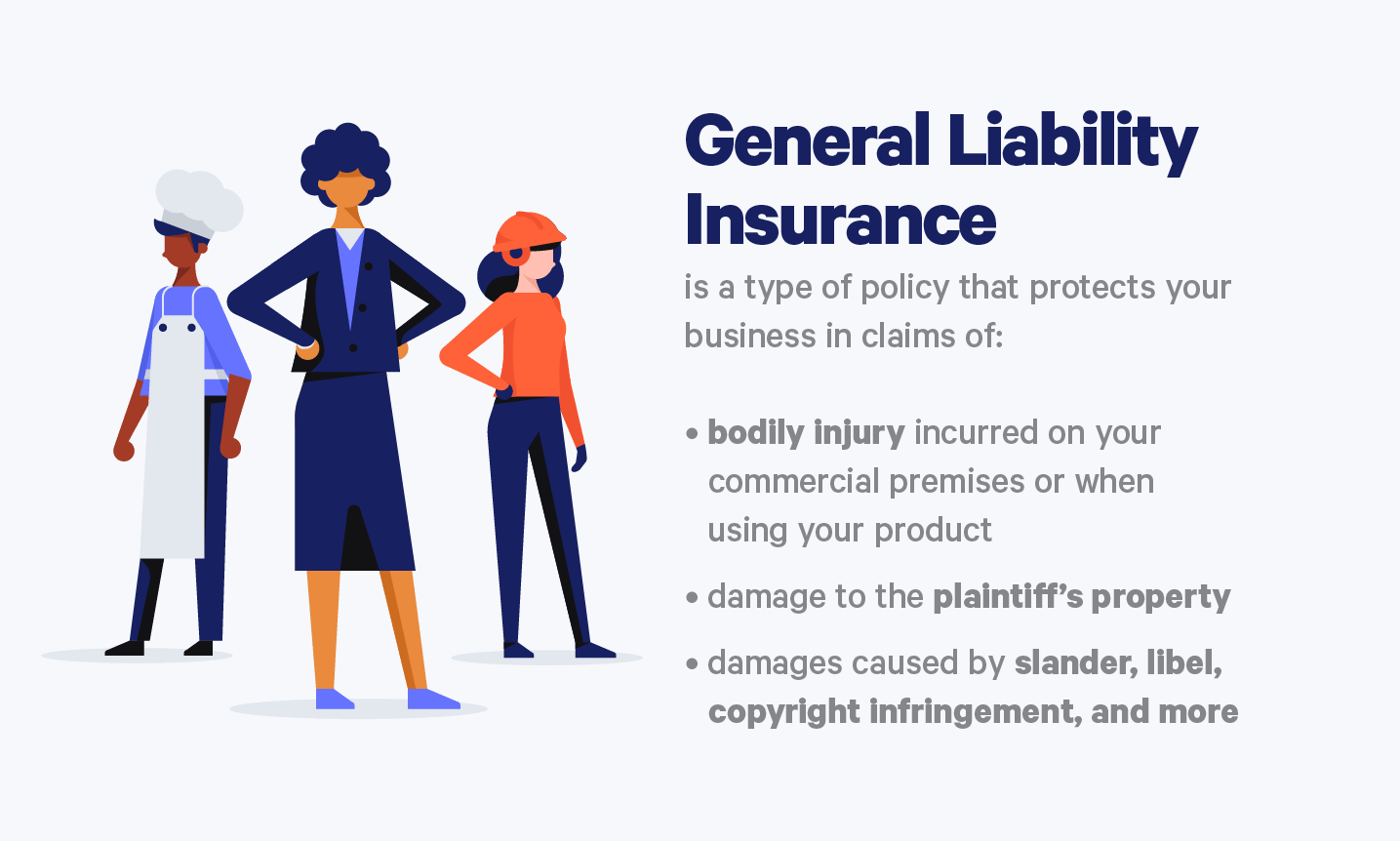Comprehensive general liability insurance for small business – In the realm of business, safeguarding against unforeseen events is paramount. Comprehensive general liability insurance (CGL) emerges as a crucial tool for small businesses, providing a comprehensive safety net against a myriad of risks that threaten their financial stability and reputation.
CGL offers a robust layer of protection against claims arising from bodily injuries, property damage, and advertising or personal injuries, ensuring that businesses can weather the storms of unexpected incidents without facing financial ruin.
Overview of Comprehensive General Liability Insurance (CGL)
Comprehensive General Liability (CGL) insurance is a cornerstone of risk management for small businesses. It provides broad coverage against claims arising from bodily injury, property damage, and personal injury, including libel, slander, and false advertising.
CGL policies are typically written on an “occurrence” basis, meaning they cover claims that arise out of an incident that occurs during the policy period, regardless of when the claim is made.
Types of Risks Covered by CGL
CGL policies typically cover the following types of risks:
- Bodily injury
- Property damage
- Personal injury
- Libel
- Slander
- False advertising
Benefits of CGL for Small Businesses
Comprehensive General Liability Insurance (CGL) offers a range of crucial benefits for small businesses, providing financial protection, safeguarding reputation, and ensuring compliance with legal requirements.
Financial Protection
CGL provides coverage for unexpected expenses and damages that arise from bodily injury, property damage, and other covered incidents. This financial protection ensures that businesses can continue operations without being crippled by unforeseen liabilities.
Safeguarding Business Reputation
When a business faces a lawsuit or claim, CGL can help protect its reputation. The insurance policy covers legal defense costs, even if the claim is ultimately found to be without merit. This allows businesses to defend their reputation and avoid costly legal battles that could damage their standing.
Compliance with Legal Requirements
Many businesses are legally required to carry CGL insurance. By obtaining this coverage, small businesses demonstrate their commitment to compliance and reduce the risk of penalties or legal action for failing to meet insurance requirements.
Key Elements of a CGL Policy
Understanding the key elements of a comprehensive general liability (CGL) insurance policy is crucial for small businesses. This policy provides essential protection against various liabilities and risks, and it’s important to grasp its components to ensure adequate coverage.
The following are the key elements of a CGL policy:
Coverage Limits and Deductibles
Coverage limits refer to the maximum amount the insurance company will pay for covered claims. Deductibles are the amount a business must pay out-of-pocket before the insurance coverage kicks in. CGL policies typically have separate coverage limits for each type of liability, such as bodily injury, property damage, and personal and advertising injury.
Deductibles can vary depending on the policy and the risk profile of the business.
Endorsements and Exclusions
Endorsements are amendments or additions to the CGL policy that modify or extend coverage. They can be used to add additional types of coverage, increase coverage limits, or clarify policy language. Exclusions are specific activities or situations that are not covered under the policy.
It’s essential to carefully review both endorsements and exclusions to ensure that the policy meets the specific needs of the business.
Importance of Understanding Policy Language
The language used in CGL policies can be complex and technical. It’s important for small businesses to thoroughly read and understand the policy language to avoid any misunderstandings or disputes in the event of a claim. If there are any unclear or confusing terms, it’s advisable to consult with an insurance agent or attorney for clarification.
How to Obtain and Manage CGL Insurance: Comprehensive General Liability Insurance For Small Business

Obtaining and managing comprehensive general liability (CGL) insurance for your small business is crucial to protect against potential financial losses. This guide provides an overview of the process of obtaining quotes, understanding the factors affecting premiums, and implementing best practices for effective coverage management.
Obtaining CGL Quotes
To obtain quotes for CGL insurance, follow these steps:
- Identify potential insurance providers: Research and compare different insurance companies that offer CGL coverage.
- Gather business information: Prepare necessary documentation, including financial statements, business licenses, and details of your operations.
- Contact insurers: Reach out to insurance agents or brokers to request quotes. Provide them with your business information and discuss your coverage needs.
- Review and compare quotes: Carefully review the quotes you receive, paying attention to coverage details, premiums, and deductibles.
Factors Affecting CGL Premiums, Comprehensive general liability insurance for small business
Several factors influence CGL premiums, including:
- Industry and business activities: The type of business and its operations can affect the risk exposure and, consequently, the premium.
- Revenue and payroll: Larger businesses with higher revenue and payroll typically pay higher premiums due to increased potential liability.
- Claims history: A history of claims or incidents can result in higher premiums.
- Location: The location of the business can impact premiums based on factors such as crime rates and environmental hazards.
- Deductible: Choosing a higher deductible can lower the premium, but it also means a higher out-of-pocket expense in the event of a claim.
Best Practices for Managing CGL Coverage
Once you have obtained CGL coverage, it’s essential to manage it effectively:
- Review your policy regularly: Periodically review your CGL policy to ensure it meets your changing business needs and coverage requirements.
- Maintain accurate records: Keep detailed records of all insurance-related documents, including policies, claims, and correspondence.
- Report claims promptly: Notify your insurance provider immediately if an incident or claim occurs to ensure timely processing and coverage.
- Consider additional coverage: Explore supplemental insurance options such as errors and omissions (E&O) insurance or cyber liability insurance to enhance your protection.
- Work with a reputable broker: Partner with an experienced insurance broker who can provide guidance, negotiate favorable terms, and assist with claims handling.
Common Claims Covered by CGL

Comprehensive General Liability (CGL) insurance provides coverage for various claims that can arise in the course of a small business’s operations. These claims typically fall into three main categories: bodily injury, property damage, and advertising and personal injury.
Bodily Injury Claims
Bodily injury claims cover injuries sustained by individuals as a result of the business’s negligence or actions. These claims can arise from various situations, such as:
- A customer slipping and falling on the business’s premises
- An employee suffering an injury while performing their job duties
- A member of the public being injured due to a defective product sold by the business
Property Damage Claims
Property damage claims cover damage to property caused by the business’s negligence or actions. These claims can arise from various situations, such as:
- A fire caused by faulty wiring in the business’s premises
- A vehicle owned by the business causing an accident
- Damage to a customer’s property while it is in the business’s care
Advertising and Personal Injury Claims
Advertising and personal injury claims cover damages resulting from the business’s advertising or marketing activities or actions that侵犯the personal rights of others. These claims can arise from various situations, such as:
- A business using false or misleading advertising
- A business making defamatory statements about a competitor
- A business using someone’s likeness or image without their consent
Exclusions and Limitations of CGL
Comprehensive General Liability (CGL) insurance provides broad coverage for small businesses, but it’s crucial to understand its exclusions and limitations. This ensures that businesses are aware of the risks not covered and can seek additional coverage as needed.
Common Exclusions
CGL policies typically exclude coverage for intentional acts, pollution, and certain professional services. Intentional acts, such as deliberate damage or harm, are not covered as they fall outside the scope of accidental or negligent incidents. Pollution exclusions vary depending on the policy, but generally exclude coverage for environmental contamination or damage caused by hazardous substances.
Importance of Understanding Policy Limitations
It’s essential for small businesses to carefully review their CGL policy and understand the specific exclusions and limitations. This helps them avoid potential gaps in coverage and ensures they have adequate protection against the risks their business faces.
Need for Additional Coverage
Depending on the nature of their operations, some businesses may need additional coverage beyond CGL. For example, businesses handling hazardous materials may require environmental liability insurance, while healthcare providers may need medical malpractice insurance. It’s recommended to consult with an insurance professional to determine if additional coverage is necessary.
Alternatives to CGL for Small Businesses

While CGL insurance is a comprehensive option for small businesses, it may not be the only choice. Here are some alternatives to consider:
Business Owner’s Policy (BOP)
A BOP is a packaged insurance policy that combines general liability, property, and business income coverage into a single policy. It is designed specifically for small businesses and typically provides more comprehensive coverage than a CGL policy. However, it may also be more expensive.
Advantages of BOPs:
- Convenience: Combines multiple coverages into one policy, simplifying management.
- Cost-effectiveness: Often more affordable than purchasing separate policies for each coverage.
- Comprehensive coverage: Includes a wider range of risks than a CGL policy.
Disadvantages of BOPs:
- Limited coverage options: May not offer the same level of customization as separate policies.
- Higher premiums: Can be more expensive than a CGL policy due to the broader coverage.
- May not meet specific business needs: Some businesses may require specialized coverage not included in a BOP.
Other Insurance Options
In addition to CGL and BOPs, small businesses may also consider the following insurance options:
- Professional liability insurance: Protects against claims of negligence or errors in professional services.
- Product liability insurance: Covers claims arising from injuries or damages caused by products sold or manufactured by the business.
- Cyber liability insurance: Protects against risks associated with data breaches, cyberattacks, and online privacy violations.
The best alternative to CGL insurance will depend on the specific needs and risks of the small business.
Case Studies and Real-Life Examples
Comprehensive General Liability (CGL) insurance plays a crucial role in protecting small businesses from financial ruin caused by various liabilities. Numerous case studies and real-life examples demonstrate the benefits of CGL insurance in safeguarding small businesses.
One notable case study involves a small construction company that accidentally damaged a neighboring property during a renovation project. The property owner filed a lawsuit against the construction company, seeking compensation for the damages. However, the construction company had CGL insurance, which covered the legal expenses and settlement costs, preventing the business from facing financial distress.
Claims Covered by CGL
CGL insurance policies cover a wide range of claims, including:
- Bodily injury or property damage caused by the business or its employees
- Advertising or slander that harms another person or business
- Legal expenses incurred in defending against lawsuits
Protection from Financial Ruin
Without CGL insurance, small businesses would be financially vulnerable to unexpected liabilities. Lawsuits can result in substantial damages, legal fees, and lost income. CGL insurance acts as a safety net, protecting businesses from financial ruin and ensuring their ability to continue operations.
Ultimate Conclusion

As a small business owner, understanding the intricacies of CGL insurance is not just advisable but essential. By delving into the details of coverage, exclusions, and claims management, you empower yourself to make informed decisions that safeguard your business from potential liabilities.
Remember, CGL is not a one-size-fits-all solution. Tailoring your policy to the unique needs of your business is crucial. By working closely with insurance professionals, you can customize your coverage to ensure optimal protection against the risks that matter most to your enterprise.